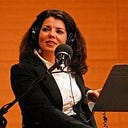We Can Do This the Easy Way…
When we pull into Eugene, Oregon, one of the Amtrak employees gets on the PA: “To the individual wearing red who was just in the café car, you bought a ticket to Eugene, but I know that you plan to get off in Salem,” he says. “The problem is, you have to pay to go to Salem. So, we can lock this train down while I go car-to-car to find you and have the police escort you out while the rest of the passengers get their pitchforks because you’re delaying them… or you can find me in the café car and pay the rest of your fare.” This is said in a perfectly jovial, charming tone. I assume the person hurried to pay their fare, as the train is on the move within three minutes.
If you thought the first day on the Coast Starlight, wait until you see day two. Here are several pictures that, because we are moving and because I’m not a great photographer, don’t do justice to the scenery outside the train windows:
I don’t start the conversation over breakfast. Instead, the woman across from me notices that I’m writing with a fountain pen and says, “My husband makes fountain pens! They’re beautiful.” Her husband, Ron, explains that he doesn’t have any of the fountain pens with him, but he pulls an elegant wooden ballpoint out of his pocket for me to examine.
Ron and Pam are on their way home to McMinnville, Oregon, which is about halfway in between Salem and Portland. The pair have lived all over the world, including six years in Papua, New Guinea, but they’ve apparently found the perfect home in McMinnville.
They’re immensely proud of the town. Jim Tankersly, who writes about taxes and economics for the New York Times, is from McMinnville. Pam says he got his start at the local paper and her friend, who knew him as a kid, describes him as a very “talented boy.” Nick Kristoff, also of the New York Times, is from the neighboring town of Yamhill. She says she was amazed to walk into their local bookstore, spot his book on the shelf, and realize that their county had spawned a Pulitzer Prize winner!
Ron is a helicopter pilot by training and trade. He started flying in Vietnam in the late 1960s and continued after he left the military. For the past few years, they’ve attended reunions of the men from Ron’s company. Ron says that, back in 1968, they were in a deadly fight. “We got shot up pretty bad,” he says, “It was one of those days.”
One of his fellow soldiers was shot through the wrist, but kept firing until he couldn’t hold the gun anymore. When they got the helicopter to clear ground and laid the man down, Ron removed the watch from the soldier’s injured wrist. He held it to his ear, noticed it was still ticking, and tucked the watch into the injured man’s flight suit pocket.
41 years later, the two saw each other for the first time at a reunion. The man still carried the watch. Ron says his former commander got up to speak and said, “You all married above yourselves.” Pam says the wives got a good laugh out of that.
The two met when Ron flew into Kentucky, where Pam was living. “Two years later,” she says, “I flew away with him.” They got married because Ron was assigned to a post in Indonesia and he could only bring Pam with him as his wife. The “proposal” consisted of Ron telling a co-worker on the phone that if he had to be married, he would go ahead and marry her. Pam overheard the conversation and they had a no-fuss wedding in Colorado. They’ll celebrate their 30th anniversary in April.
While they were in Papua, they worked in the same group as the mammologist Tim Flannery and remember the excitement among the small community when Flannery discovered a new species of tree kangaroo. They also worked alongside a geologist who was somewhat accident-prone. He fell off a waterfall, fell down from a tree canopy, and got his foot caught underneath a helicopter. They laugh when they tell me that they worried for a moment when they found out he was on the same overseas flight as they were. “But everything was fine,” Pam says, “And his baby was well behaved.”
I ask Ron what he loves about helicopters. He says, “A helicopter is more like really flying, more like being a bird. If you want to stop, you stop; if you want to go backward, you go backward. It’s freedom.”
That evening, we pull into Portland Union Station, where we have about 20 minutes to get out and stretch our legs. One piece of advice for long distance train travel: when they give you the chance to get out and walk, take it.
